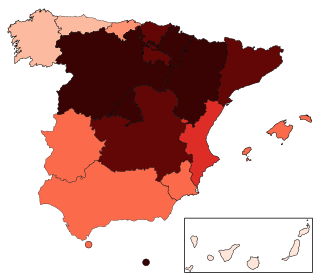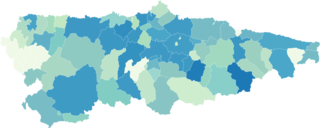Related Research Articles

A state of emergency is a situation in which a government is empowered to put through policies that it would normally not be permitted to do, for the safety and protection of its citizens. A government can declare such a state during a natural disaster, civil unrest, armed conflict, medical pandemic or epidemic or other biosecurity risk.

The Ministry of Culture (MC) is the department of the Government of Spain responsible for the promotion, protection and dissemination of the Spanish historical heritage, national museums, art, books, reading and literary creation, of cinematographic and audiovisual activities and of national archives and libraries.

Civil conscription is the obligation of civilians to perform mandatory labour for the government. This kind of work has to correspond with the exceptions in international agreements, otherwise it could fall under the category of unfree labour. There are two basic kinds of civil conscriptions. On the one hand, a compulsory service can be ordered on a temporary basis during wartimes and other times of emergency, like severe economic crisis or extraordinary natural events to provide basic services to the population. These include, but are not limited to, medical care, food supplies, defense industry supplies or cleanup efforts, following a severe weather or environmental disaster for the duration of the emergency. Therefore, it generally makes striking illegal for the duration of the civil mobilization. On the other hand, a revolving mandatory service may be required for a longer period of time, for example, to ensure community fire protection or to carry out infrastructure work at a local or community level.

The Ministry of Economy, Trade and Enterprise (MINECO) is the department of the Government of Spain responsible for the proposing and carrying out the government policy on economic affairs, business support and reforms to improve economic potential growth as well as acting as the communication channel with the European Union and other economic and financial international organizations in this matters. Likewise, this department is responsible for the telecommunications policy and the digital transformation.

The Ministry of Health (MISAN) is the department of the Government of Spain responsible for proposing and executing the government policy on health, planning and providing healthcare as well as the exercise of the powers of the General State Administration to assure citizens the right to health protection. The Ministry is headquartered in the Paseo del Prado in Madrid, opposite the Prado Museum.

The Ministry of Territorial Policy and Democratic Memory (MPTMD), is the department of the Government of Spain which manages the policies of the government regarding relations and cooperation with the Autonomous Communities and with the entities that integrate the Local Administration and those related to the territorial organization of the country and with the Government Delegations and Sub-Delegations in the regions and provinces.

The Ministry for the Ecological Transition and the Demographic Challenge (MITECO) is the department of the Government of Spain responsible for developing the government policy on fight against climate change, prevention of pollution, protecting the natural heritage, biodiversity, forests, sea, water and energy for a more ecological and productive social model. Likewise, it is responsible for the elaboration and development of the government policy against the country's demographic challenges.

Isabel Natividad Díaz Ayuso is a Spanish politician and journalist serving as the president of the Community of Madrid since 2019. She is the president of the People's Party of the Community of Madrid.

Madrid Central is a low-emission zone located in the center of Madrid. It was inaugurated on November 30, 2018. There is little industry in the center of the city, and vehicular traffic has been responsible for a significant proportion of emissions there.

La Ingobernable is a series of self-managed social centres in central Madrid, Spain. The squats have been used by feminist, environmentalists, LGBTI, anti-racist and other cultural groups. Between 2017 and 2019, the La Ingobernable was based in a municipal building located at the corner of Paseo del Prado and Calle del Gobernador. It was then located at Calle Alberto Bosch 4, behind the Prado Museum from March until April 2020, when it was evicted during the state of alarm. In 2021, an Office for Social Rights was set up at Calle Cruz 5.

The Ministry of Social Affairs (MAS), since 2023 known as Ministry of Social Rights, Consumer Affairs and 2030 Agenda, is a department of the Government of Spain responsible for the government policies on social services, family, minors protection, disability and prevention of youth crime, adoptions and foster care and the promotion of cultural communication and youth association. Likewise, the department is responsible for the government policies on animal welfare and UN Sustainable Development Goals.

The Ministry of Consumer Affairs was a department of the Government of Spain responsible for policies regarding the protection and defense of consumer rights, as well as the regulation, authorization, supervision, control and, where appropriate, sanction of state-level gambling and gaming activities.

The Ministry of Inclusion, Social Security and Migration is a department of the government of Spain responsible for planning and carrying out the government policy on Social Security, foreigners, immigration and emigration.

The Ministry of Universities was a ministerial department in the Government of Spain responsible for proposing and carrying out the government policy on universities as well as representing Spain in the European Union and other international organizations regarding universities.

The COVID-19 pandemic in Spain has resulted in 13,980,340 confirmed cases of COVID-19 and 121,852 deaths.

The COVID-19 pandemic in El Salvador was a part of the worldwide pandemic of coronavirus disease 2019 caused by severe acute respiratory syndrome coronavirus 2. The virus was confirmed to have reached El Salvador on 18 March 2020. As of 19 September 2021, El Salvador reported 102,024 cases, 3,114 deaths, and 84,981 recoveries. As of that date El Salvador had arrested a total of 2,424 people for violating quarantine orders, and 1,268,090 people had been tested for the virus. On 31 March 2020, the first COVID-19 death in El Salvador was confirmed.

The COVID-19 pandemic in Asturias was part of the Spanish outbreak of the worldwide COVID-19 pandemic.

The COVID-19 pandemic in Spain had its first case in the Community of Madrid on 25 February 2020.

Félix Bolaños García is a Spanish lawyer and politician who serves as minister for the Presidency, Justice and Parliamentary Relations since 2023. Previously, he served as Secretary-General of the Office of the Prime Minister of Spain from 2018 to 2021, and as minister of the Presidency, Parliamentary Relations and Democratic Memory from 2021 to 2023.
References
- ↑ "Ley Orgánica 4/1981, de 1 de junio, de los estados de alarma, excepción y sitio". Noticias Jurídicas. Retrieved 2020-03-13.
- ↑ Mars, A.; Romero, A.; Álvarez, P. (4 December 2010). "El Gobierno declara el estado de alarma y moviliza a los controladores". El País (in Spanish). Madrid: Prisa . Retrieved 27 October 2019.
- ↑ "El Gobierno declara el estado de alarma". El Mundo (in Spanish). Unidad Editorial Internet, S.L. 5 December 2010. Retrieved 27 October 2019.
- ↑ "Striking Spain air traffic controllers return to work". BBC. December 4, 2010.
- ↑ Hernández, Marisol (13 March 2020). "Pedro Sánchez decreta el estado de alarma en toda España para frenar la expansión del coronavirus". El Mundo .
- ↑ "BOE.es - Documento BOE-A-2020-3692". www.boe.es. pp. 25390–25400. Retrieved 2020-03-15.
- ↑ Fin del estado de alarma: la libre movilidad y el turismo extranjero se extienden a todo el territorio in expansion.com
- ↑ El Gobierno decreta el estado de alarma tras la negativa de Ayuso a cerrar Madrid in elconfidencial.com (in Spanish)
- ↑ Benayas, Victoria Torres (2020-10-24). "Así son las medidas en la Comunidad de Madrid tras agotarse el estado de alarma". EL PAÍS (in Spanish). Retrieved 2020-10-25.
- ↑ "Spain's top court rules that the coronavirus state of alarm was unconstitutional". elpais.com. 14 July 2021.
- ↑ "Court declares Spain's 2nd COVID state of alarm unconstitutional". aa.com.tr. 27 October 2021.